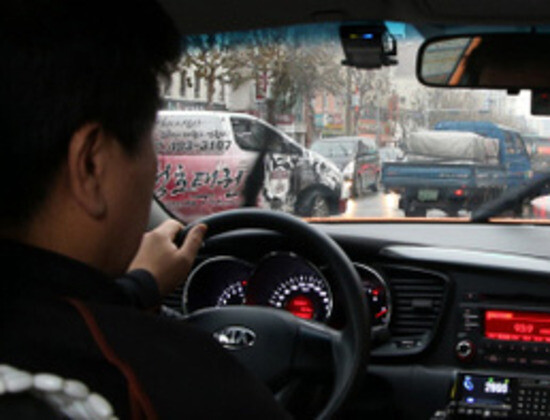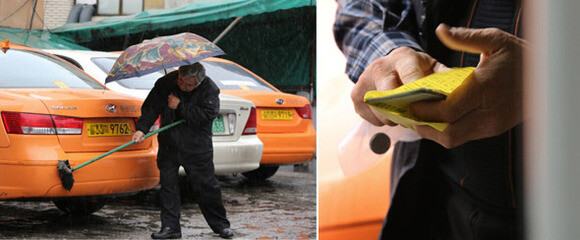hankyoreh
Links to other country sites 다른 나라 사이트 링크
[Special feature- Part 1 of 3] The lives of taxi drivers who have fallen out of the middle class

By Jeon Jong-hwi, staff reporter
The shrinking of the middle class is the strongest indicator that South Korean society is becoming more polarized and unequal. According to Statistics Korea, 69.6% of South Koreans belonged to the middle class in 1998, whereas in 2011, only 64% did. Following the 1997 IMF crisis and the 2008 global financial crisis, the Korea‘s middle class is under severe threat of being broken down. The fifth feature story of ’Investigative Reporting into Social Polarization‘ is about people who have taken jobs as taxi drivers after falling out of middle class careers.The orange taxi number 9704 glistened in its gallant aura. As a taxi with only 53,000km on it, it is considered still to be in near mint condition.
On the Jan. 21, taxi number 9704 left from its ‘B taxi company’ garage located in Seoul’s Myeongmok neighborhood to begin service. After dropping off its first passenger in Gwanghwamun, it took a Japanese tourist to the Hilton hotel in the Dongja neighborhood. Soon after, two Chinese businessmen and a Korean guide got in the taxi asking to go to a Korean restaurant in the Jongno district. The businessmen from Hangzhou were conversing about their plans to play golf in Korea and their schedule for the next day in Seoul.
“You must be tired after traveling from Hangzhou.”
The Korean guide was startled by the fact that Mr. Choi, 51, the driver of the taxi was able to speak Chinese. The guide conversed with the two businessmen for awhile, explaining how educated and intelligent many taxi drivers are. Mr. Choi felt bittersweet towards the guide’s explanation of Korean taxi drivers. Mr. Choi was a businessman before he started working as a driver.
His first business venture was in 1996 in Jinjiang, Fujian province, China. His job was to cheaply sell Korean leather to Chinese original equipment manufacturers that specialize in shoes. Mr. Choi’s company consisted of just him and his interpreter. His business began to flourish as he found more companies to trade with, in part because there were not many competitors. Due to the nature of his business and his trading in dollars, the 1997 IMF Crisis was an opportunity rather than a setback. On some occasions, he would earn as much as 40 million won (more than US$40,000 at the time) profit in a month. Mr. Choi bought an Audi and would play golf three or four times a week.
"Ichon-dong please.” After the Chinese businessmen left, his next passenger stated his destination. “Yes, sir”, with a short answer, Mr. Choi left towards his next destination in the Seoul night.
Traveling to various places in Seoul and taking customers to their destinations, in the background the radio mutters: “Over half of the people in our country think that their incomes are lower than middle class…”
Mr. Choi used to be a successful businessman in China and was considered a member of the middle class who had no reason to envy anyone. However, he suffered a series of misfortunes. The greed of Chinese government officials and the betrayal of several Chinese companies Mr.Choi used to trade with ultimately affected his credibility. In 2006, Mr.Choi left China, exhausted from his business, and started fresh as a taxi driver in Seoul. Since then, 6 years have passed.

Driving in Gangnam, the symbol of wealth
On the night of Jan. 21, after dropping off a female passenger in Seoul’s Seocho neighborhood, taxi number 9704 mainly stayed in the Gangnam area. There are a lot of customers during the night. After dropping off a passenger in the Bogwang neighborhood in the Gangbuk district and a male passenger at Sampoong apartment in Seocho, the taxi picked up a female passenger who was heading to the Ilwon neighborhood. The radio was playing Kim Jong-oeo’s pop song ‘Winter Rain’. Mr. Choi usually does not like to converse with his passengers; he prefers listening to CBS radio.
Two men got in the taxi on their way to Suseo Police station. One of the passengers was severely drunk. As a businessman in China, Mr. Choi would often have to entertain officials, which involved lots of drinking. After transferring from being a hotel management major at ‘K’ university in Seoul to majoring in metallurgy at ‘S’ university, Mr. Choi‘s business venture in China was not a coincidence.
Mr. Choi’s first job was at an English textbook company in Seoul. After joining the company in 1987, it went bankrupt after the year the Olympics were held in Korea. He married a woman he had worked with there in 1990. The next year, Mr. Choi moved to his brother-in-law’s leather company, where he was in charge of trading. But in 1994 that company also went bankrupt. With only his youth, ambition and a briefcase, Mr. Choi boarded a plane headed to Fujian in China. He thought that trading leather in China would be profitable.
Accompanied only by an interpreter, Mr. Choi started his business from the bottom up. His business was to import leather for shoes from Korea and sell them cheaply to factories in Jinjiang. Mr. Choi imported 8 containers of leather each month. “I would then earn 20 million won (more than US$20,000 at the time).” There was no reason for Mr. Choi to not bring his family to China. After a year, Mr. Choi purchased a 3 story villa in Bundang New Town in Gyeonggi Province. His wife opened an apparel store on the first floor of a hotel in Jinjiang. The store was always full of Chinese middle-class customers and the Korean apparel sold quickly. With the continuous success, Mr. Choi then opened a Korean restaurant. He rented a large 4 story building, and used the whole building as the restaurant. The chef was invited from Korea and 30 locals were hired as staff.
“At that time, I felt so passionately that anything I did would be successful,” Mr. Choi said.
The restaurant barely lasted five months. Mr. Choi didn’t learn enough about the business before opening. The restaurant would lose its electricity once a week because of the poor local supply. The restaurant was too large for him to manage. As business began to slow at the apparel store, Mr. Choi’s wife and children moved to Shanghai to open a new store. Mr. Choi had to reimburse a Chinese trading company for 200 million won (more than US$200,000 at the time) after his business partner committed fraud. From then on, his business went downhill. Mr. Choi said, “In the world of business, it is hard to recover once you start failing”. There was even a case where a local employee stole 30 million won. Mr. Choi has concluded that his addiction to golf, neglect of his business and failure to come up with new ideas also contributed to his failure.
After returning to Korea in 2002, Mr. Choi divorced with his wife. Their situation could be described as out of sight out of mind. The villa in Bundang was taken by his wife as compensation during the divorce. Mr. Choi tried to come back from his failure, spending 4 years traveling to and from China but couldn’t succeed.
In explaining why he became a taxi driver in 2006, Mr. Choi said, “I have nothing, no skills, and nor the youth to work at a construction site”.
Translated by Kim Kyung-min, Hankyoreh English intern
Please direct questions or comments to [english@hani.co.kr]

Editorial・opinion
![[Column] The state is back — but is it in business? [Column] The state is back — but is it in business?](https://flexible.img.hani.co.kr/flexible/normal/500/300/imgdb/original/2024/0506/8217149564092725.jpg) [Column] The state is back — but is it in business?
[Column] The state is back — but is it in business?![[Column] Life on our Trisolaris [Column] Life on our Trisolaris](https://flexible.img.hani.co.kr/flexible/normal/500/300/imgdb/original/2024/0505/4817148682278544.jpg) [Column] Life on our Trisolaris
[Column] Life on our Trisolaris- [Editorial] Penalties for airing allegations against Korea’s first lady endanger free press
- [Editorial] Yoon must halt procurement of SM-3 interceptor missiles
- [Guest essay] Maybe Korea’s rapid population decline is an opportunity, not a crisis
- [Column] Can Yoon steer diplomacy with Russia, China back on track?
- [Column] Season 2 of special prosecutor probe may be coming to Korea soon
- [Column] Park Geun-hye déjà vu in Yoon Suk-yeol
- [Editorial] New weight of N. Korea’s nuclear threats makes dialogue all the more urgent
- [Guest essay] The real reason Korea’s new right wants to dub Rhee a founding father
Most viewed articles
- 1[Column] Why Korea’s hard right is fated to lose
- 2Amid US-China clash, Korea must remember its failures in the 19th century, advises scholar
- 3[Column] The state is back — but is it in business?
- 4[Column] Life on our Trisolaris
- 5[Guest essay] Maybe Korea’s rapid population decline is an opportunity, not a crisis
- 6OECD upgrades Korea’s growth forecast from 2.2% to 2.6%
- 7AI is catching up with humans at a ‘shocking’ rate
- 8[Column] Can Yoon steer diplomacy with Russia, China back on track?
- 9[Editorial] Yoon must halt procurement of SM-3 interceptor missiles
- 1060% of young Koreans see no need to have kids after marriage